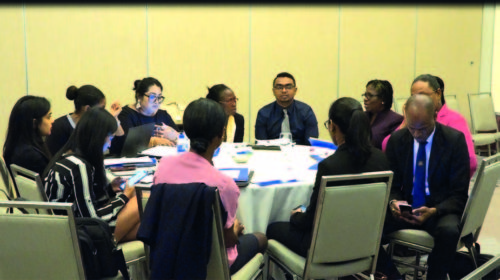
A bigger economy has both risks and rewards and according to Attorney General Basil Williams, the Anti-Money Laundering (AML) Risk Assessment currently underway will examine a number of new areas, including the oil sector, for loopholes in the system.
Williams was at the time speaking at a Money Laundering and Terrorism Financing Risk Assessment workshop at the Guyana Marriott on Wednesday. According to Williams, these crimes can have a disastrous effect on the country in a number of ways.
With Guyana recently starting oil production and a number of businesses looking to invest in the sector, Williams stressed the timeliness of this assessment. He noted that armed with the results of the assessment, agencies in the anti-money laundering fight can better prepare for the challenge.
“We are now an oil-producing nation. This new sector has changed our financial landscape. There has been an increase in business and investment and our economy is growing. While this is good, we must also be vigilant as a growing economy brings additional risks, as it is a breeding ground for criminals,” the Attorney General also said.
Meanwhile, Klaudijo Stroligo of the World Bank guaranteed the institution’s continued support for the evaluation. The financial crimes expert also reminded Guyana that they should not only go through anti-corruption steps to satisfy international obligations but because it’s the right thing to do.
“Very importantly, you’re doing this for yourself. You’re not just doing it for CFATF or other international organisations. You’re doing this for yourself in order to mitigate risks and (you’ll need to) make political decisions in order to mitigate the risks… this is the real picture of yourself that you’ll want to show and be honest with yourself.”
“The good news is the World Bank will be assisting you to finalise the risk assessment, the report and the action plan and also to assist you in implementing the action plan. The most important part is the action plan and implementation. If you identify something wrong, it doesn’t necessarily mean you’ll deal with the process. Implementation matters. It’s only when you implement recommendations, you can show the effectiveness.”
Guyana launched its second risk assessment in December with a working group of representatives from Public and Private Sector organisations. It comes even as Guyana prepares for the Caribbean Financial Action Task Force (CFATF) fourth Round Mutual Evaluation, scheduled for 2022.



